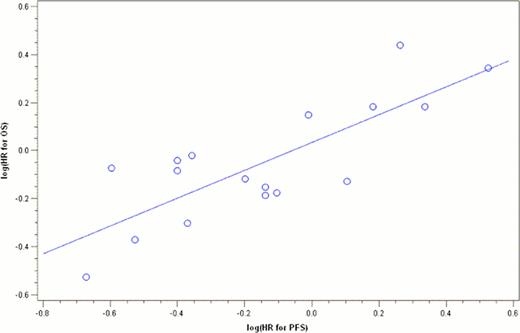Abstract
Abstract 4241
The primary goals in the development of new oncology therapies are treatments that improve quality of life and overall survival (OS). In recent years, advances in the treatment of multiple myeloma (MM) have led to improvements in OS. However, with improved treatment options and multiple rounds of therapy it is becoming an increasing challenge to demonstrate OS improvements in clinical trials. Thus, progression free survival (PFS) is widely used as a surrogate endpoint to demonstrate long term clinical benefit. However, to our knowledge, there has been very limited analysis of the association between treatment effects on PFS and treatment effects on OS in patients with multiple myeloma (MM).
To evaluate whether observed treatment effects on PFS are positively associated with treatment effects on OS in MM based on published data from clinical trials in patients with MM.
A systematic literature review of MM identified 13 published clinical trials that reported HRs for the effects of treatment on PFS and separately on OS. The patients in 12 of the studies were previously untreated, and one study included patients with relapsed/refractory disease. The Pearson correlation coefficient (Pearson r) was used to estimate the association between the reported hazard ratios (HRPFS and HROS), as well as the log-transformed HRs (log(HRPFS) and log(HROS)), for the treatment effects on PFS and OS. Linear regression models were used to evaluate the relationship between the HR, and log(HR), of PFS and OS. A log transformation of the HRs for PFS and OS was used in order to minimize any skewness and normalize the data. R-squared values were estimated from the regression models. 95% Confidence intervals around the R-squared values were estimated using Olkin and Finn's approximation (I. Olkin and J. D. Finn, Psychological Bulletin, Vol 118(1), Jul 1995, 155–164) of the standard error and Student's T distribution. Sensitivity analyses included the estimation of additional weighted regression models to investigate the robustness of the R-squared estimates using two weighting methods. Individual study sample sizes were used as weights in one method to allocate more precision to studies with larger sample sizes. Estimates of the geometric mean of the variance of the HRs were also utilized as weights to account for the multi-directional error around the two HRs. The geometric mean estimates were calculated as the inverse of the product of the width of the two HRs.
Pearson r estimates between the HRs for the treatment effects on PFS and OS showed a strong positive correlation between HRPFS and HROS r=0.815 (CI: 0.53–0.93; p<0.0001), and between log(HRPFS) and log(HROS) r=0.80 (CI:0.50–0.92; p=0.0001), indicating that the treatment effects on PFS and treatment effects on OS in MM are positively associated. The HRPFS and log(HRPFS) were significantly associated with the HROS and log(HROS), respectively, based on the linear regression models. The R-squared values for these models were 0.66 (CI: 0.43–0.89) for the regression of HROS on HRPFS and R-squared values of 0.64 (CI: 0.40–88) for the regression of log(HROS) on log(HRPFS). Figure 1 displays the association between the log-transformed HRs. The sensitivity analysis results for the Pearson r and R-squared values were generally consistent with the primary analysis. Pearson r estimates ranged from 0.67 to 0.84, and the weighted regressions between HROS and HRPFS produced the extremes for the R-squared estimates: 0.71 and 0.45 when weighting by sample size and geometric mean of the variances, respectively. A separate regression model was considered that also adjusted for available covariates (age, population, length of follow-up). These covariates were not statistically significant predictors at the alpha = 0.05 level. With the addition of these covariates, the R-squared value for the linear regression of log(HROS) on log(HRPFS) was 0.695.
This analysis based on published MM clinical trial results indicate that treatment effects on PFS may be positively associated with treatment effects on OS. Further studies involving patient-level data would be necessary to confirm these results.
Linear regression between log(HROS) and log(HRPFS)
Zhang:BMS: Employment. Cartier:OptumInsight: Consultancy. Rosen:BMS: Consultancy. Teitelbaum:Optum Insight was hired to do literature review: Employment. Bartlett:Bristol-Myers Squibb: Employment. Kroog:Bristol-Myers Squibb: Employment. Mukhopadhyay:BMS: Employment. Wagner:Bristol-Myers Squibb: Employment.
Author notes
Asterisk with author names denotes non-ASH members.


This feature is available to Subscribers Only
Sign In or Create an Account Close Modal